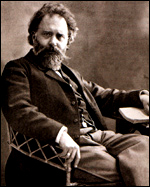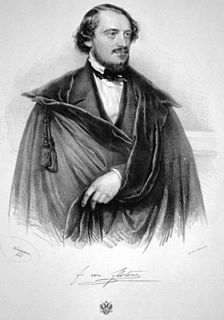External links
- Die Abreise : Scores at the International Music Score Library Project
Die Abreise (The Departure) is a comic opera in one act by composer Eugen d'Albert. The libretto was written by Ferdinand Sporck, a friend of the composer, after a play by August Ernst Steigentesch.
Eugen d'Albert composed the opera in 1896. The score was published by Max Brockhaus Musikverlag in 1898, [1] and is now available from Boosey & Hawkes. [2]
The opera was first performed 20 October 1898 at the Alte Oper in Frankfurt, under the baton of Ludwig Rottenberg. [3]
| Role [2] | Voice type [2] | Premiere cast, 20 October 1898 [3] Conductor: Ludwig Rottenberg |
|---|---|---|
| Gilfen, a baron | baritone | Rudolf Brinkman |
| Luise, his wife | soprano | Hedwig Schacko |
| Trott, a baron, their friend | tenor | Max Pichler |
Gilfen and Luise have been married for many years, and the passion in their relationship has dimmed considerably. Gilfen has been planning to undertake a long journey, but he has postponed his departure every time because he was afraid his wife would take advantage of the situation. And so, he never departed.
Trott, a friend of the couple, is in love with Luise, so it is easily understood why he advises his friend to finally undertake the long planned journey. Gilfen (who has guessed Trott's motives) plays along and takes leave from his wife, faking his departure. Trott immediately seizes the opportunity, but Luise rejects him.
Gilfen then returns to find (much to his surprise and delight) that his wife has been faithful to him. Now it is Trott's turn to leave. Gilfen and Luise finally have time for each other again and they decide to renew their love.
In 1998 CPO released a recording made in 1978 at the Ruhrfestspielhaus . János Kulka conducted the Philharmonia Hungarica; the singers were Hermann Prey (Gilfen), Edda Moser (Luise) and Peter Schreier (Trott). [4] [5]
Der Besuch der alten Dame is an opera in three acts by Gottfried von Einem to a German libretto by Friedrich Dürrenmatt, based on his 1956 play of the same name.

La clemenza di Tito, K. 621, is an opera seria in two acts composed by Wolfgang Amadeus Mozart to an Italian libretto by Caterino Mazzolà, after Pietro Metastasio. It was started after most of Die Zauberflöte, the last of Mozart's principal operas, had already been written. The work premiered on 6 September 1791 at the Estates Theatre in Prague.

EugenFrancis Charles d'Albert was a Scottish-born pianist and composer.

Eine florentinische Tragödie, Op. 16, is an opera in one act by Alexander von Zemlinsky composed in 1915–16 to a libretto adapted by the composer from a German translation by Max Meyerfeld of Oscar Wilde's unfinished play A Florentine Tragedy.

Tiefland is an opera in a prologue and two acts by Eugen d'Albert, to a libretto in German by Rudolf Lothar. Based on the 1896 Catalan play Terra baixa by Àngel Guimerà, Tiefland was d'Albert's seventh opera, and is the one which is now the best known.
Guglielmo Ratcliff is a tragic opera in four acts by Pietro Mascagni to an Italian libretto by Andrea Maffei, translated from the German play Wilhelm Ratcliff (1822) by Heinrich Heine. Mascagni had substantially finished the composition of Ratcliff before the success of his first opera, Cavalleria rusticana.

Hans Heiling is a German Romantic opera in 3 acts with prologue by Heinrich Marschner with a libretto by Eduard Devrient, who also sang the title role at the première at the Königliche Hofoper, Berlin, on 24 May 1833. From there, the work went on to become Marschner's most successful opera. The opera brought the composer a considerable reputation, although this did not materially affect his position in Hanover, where he was music director of the Court Theatre. Like Marschner's other great success, Der Vampyr, the plot of Hans Heiling makes great use of supernatural elements. As with several of his operas, Hans Heiling is based on a folk legend.

A Village Romeo and Juliet is an opera by Frederick Delius, the fourth of his six operas. The composer himself, with his wife Jelka, wrote the English-language libretto based on the short story "Romeo und Julia auf dem Dorfe" by the Swiss author Gottfried Keller. The first performance was at the Komische Oper Berlin on 21 February 1907, as Romeo und Julia auf dem Dorfe. Thomas Beecham conducted the British premiere at the Royal Opera House, Covent Garden in London on 22 February 1910. The US premiere was on 26 April 1972 in Washington, D.C.

M. Choufleuri restera chez lui le... is an opéra bouffe, or operetta, in one act by Jacques Offenbach and the Duc de Morny. The French libretto is also credited to Morny, though Ludovic Halévy, Hector-Jonathan Crémieux, and Morny's secretary Ernest L'Épine probably contributed to the text as well.
Der Golem is an opera in three acts by composer Eugen d'Albert. The work uses a German language libretto by Ferdinand Lion after Arthur Holitscher's 1908 play Der Golem: Ghettolengende in drei Aufzügen. The opera premiered on 14 November 1926 at the Oper Frankfurt, conducted by Clemens Krauss.

Guercœur is an opera in three acts by the French composer Albéric Magnard to his own libretto. It was first performed posthumously at the Paris Opéra on 24 April 1931, though it had mostly been written between 1897 and 1901. The composer died trying to save his house from the invading Germans at the beginning of World War I in 1914 and the score was partially destroyed in the resulting fire. Magnard's friend Guy Ropartz reconstructed the missing sections so the opera could be staged. The music shows the strong influence of Wagner.
Padmâvatî is an opera in two acts by the French composer Albert Roussel. The libretto, by Louis Laloy, is based on Théodore-Marie Pavie's La légende de Padmanî, reine de Tchitor, which retells the legend recounted in Malik Muhammad Jayasi's poem Padmavat (1540). It was first performed at the Paris Opéra on June 1, 1923. Roussel styled the work an opéra-ballet and there are many dance numbers and opportunities for spectacle. The composer was inspired by his visit to the ruined city of Chittor in Rajputana and he incorporated many features of Indian music into the score.

Der Evangelimann is an opera in two acts by the Austrian composer Wilhelm Kienzl. The libretto, by the composer, is based on Leopold Florian Meissner's short story "Aus den Berichten eines Polizeikommissärs". It was adapted in 1924 as a silent film The Evangelist.

Fennimore und Gerda is a German-language opera with four interludes, by the English composer Frederick Delius. It is usually performed and recorded in English, as Fennimore and Gerda in a translation by Philip Heseltine. The German libretto, by the composer himself, is based on the novel Niels Lyhne by the Danish writer Jens Peter Jacobsen. In neither German nor English is the libretto highly regarded; rather, the work is considered an "orchestral opera", limited in its dramatic appeal but voluptuous and engaging in its instrumental texture.

The Little Sweep, Op. 45, is an opera for children in three scenes by the English composer Benjamin Britten, with a libretto by Eric Crozier.
Die toten Augen is an opera with a prologue and one act by Eugen d'Albert to a libretto in German by Hanns Heinz Ewers and Marc Henry after Henry's own 1897 play Les yeux morts.
Prometheus is an operatic 'Szenisches Oratorium' in five scenes by Rudolf Wagner-Régeny, with a German libretto by the composer after Aeschylus. The opera also uses Goethe's poem "Prometheus".

Barry Ernest Conyngham,, is an Australian composer and academic. He has over seventy published works and over thirty recordings featuring his compositions, and his works have been premiered or performed in Australia, Japan, North and South America, the United Kingdom and Europe. His output is largely for orchestra, ensemble or dramatic forces. He is an Emeritus Professor of both the University of Wollongong and Southern Cross University. He is former Dean of the Faculty of the Fine Arts and Music at the University of Melbourne.

Les dragons de Villars is an opéra-comique in three acts by Aimé Maillart to a libretto by Lockroy and Eugène Cormon. The story of the opera was said to have been borrowed from La Petite Fadette by George Sand, updated by the librettists to the time of Louis XIV. It was premiered by the Théâtre Lyrique in Paris on 19 September 1856. It is also known by the English title The Hermit's Bell

Alessandro Stradella is a romantic opera in three acts composed by Friedrich von Flotow to a German libretto by "Wilhelm Friedrich". Set in Venice and the countryside near Rome, it is loosely based on the colourful life of the 17th-century Italian composer and singer Alessandro Stradella. It was first performed in its full version on 30 December 1844 at the Stadttheater in Hamburg.